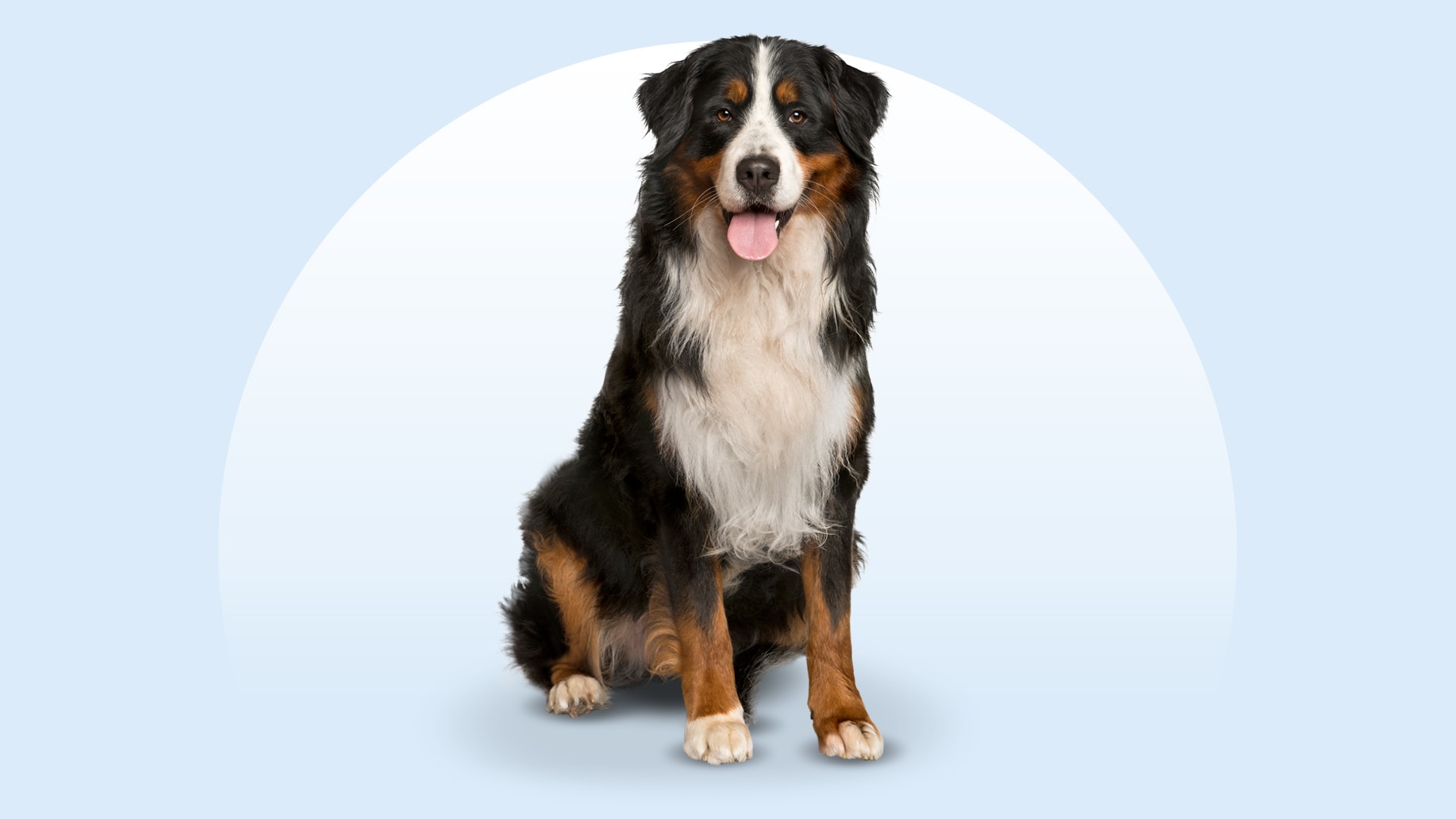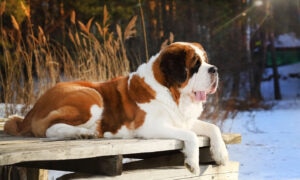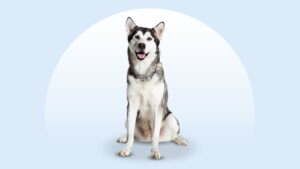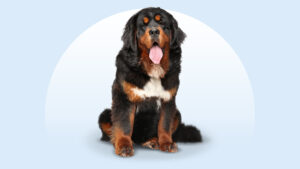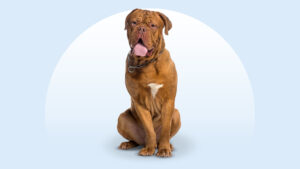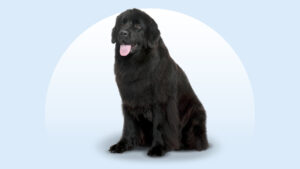Bernese Mountain Dog
Updated June 4, 2025
Bernese Mountain Dog
Updated June 4, 2025
Bernese Mountain Dogs are gentle giants with an unwavering loyalty to their person, making them the perfect family pet. They thrive in calm homes with pet parents who can offer outdoor adventures and lots of love.
Affectionate, Fun-Loving, Loyal
70–115 lbs
23–27.5 inches
7–10 years
Black Rust and White, Black Tan and White
If you’re the kind of family who can’t wait to pack up for a weekend camping trip, you’re going to love the Bernese Mountain Dog. These pups live for the weekends, when the great outdoors calls their name and they sprint outside. It’s not that they have unlimited energy or even a lot of energy by canine standards—they just don’t like to be bored.
These easygoing pups radiate friendliness, from their big smile to their animated eyes to their fluffy, always-wagging tail. Bernese Mountain Dogs just want to make you happy.
Bernese Mountain Dog Characteristics
Bernese Mountain Dog Appearance
Bernese Mountain Dogs—aka Berners—have playful brown eyes and a deservedly proud gait that gives them a noble air. Don’t let that fool you, though; they’re big softies at heart.
Their thick, distinctly marked tri-color coat is mostly black, with white markings and rust-colored highlights. Their bushy tail is ready to wag whenever they see you.
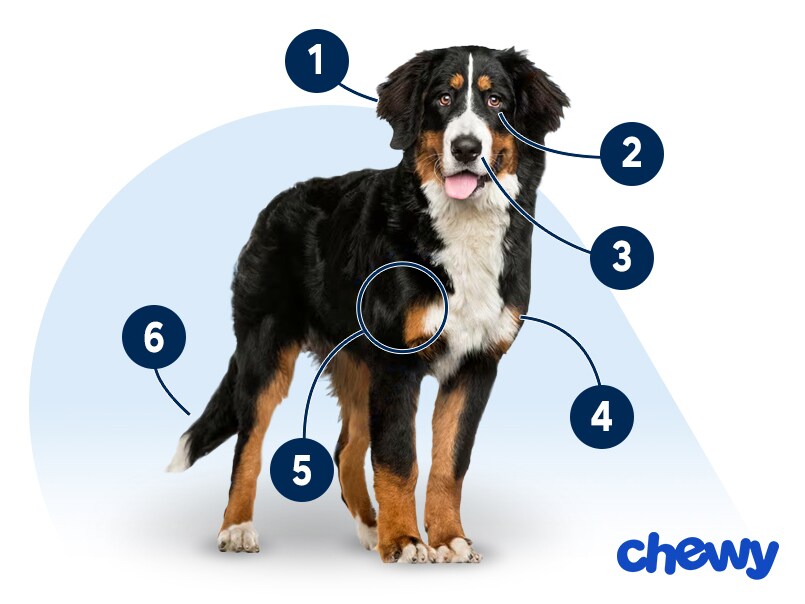
- Ears
Their gently rounded, triangular ears hang close to the head when relaxed. When something catches the Bernese Mountain Dog’s attention, they bring their ears forward attentively.
- Eyes
They have intelligent, oval-shaped eyes that are typically brown. In rare cases, their eyes might be blue.
- Nose
Their nose is black and their snout is straight.
- Coat Length
The Bernese Mountain Dog's medium-length, thick double coat can be wavy or straight. It typically has a healthy shine.
- Coat Color
Berners have a distinctive tricolored coat that’s black, white, and rust. They have white on their chest, muzzle, and the tip of their tail. They sometimes have white on their feet, too.
- Tail
Bernese Mountain Dogs have a bushy tail that they sometimes carry higher when alert. Their tails are low when they’re relaxed.
Bernese Mountain Dog Temperament
Berners are great pets, partly due to their adoring temperament—yes, they’re pretty much obsessed with you, and they’d like the sentiment returned.
These are not dogs who want to be left to do their own thing in the yard when you let them out, so grab a ball and play a game of fetch if they’re into it. Berners love to explore, so take them with you on adventures outside the neighborhood, too. After a hike or trip to the dog park, they love nothing more than cuddling up with you.
These dogs are smart and eager to please, and they thrive with structured games or sports. Although they’re not a high-energy dog like the Border Collie, Bernese Mountain Dogs still need consistent daily exercise. They typically love agility courses and scent walks.
Although the Bernese Mountain Dog’s size makes them big and strong, they’re also gentle and kind. These patient dogs are good with children, provided that both children and pups are taught how to behave around each other.
Like many dogs, Berners might be shy around strangers or in new situations, so give them time to adjust. It’s helpful to socialize them as puppies, or as early as you can if you adopt a Bernese Mountain Dog.
How to Care for a Bernese Mountain Dog
Berners are known for their patience, but they still need socialization. They also need lots of brushing, especially when the seasons change in the spring and fall.
These pups thrive with mental and physical exercises, so get them involved in dog sports and other fun activities. But Bernese Mountain Dogs’ thick coats can make hot weather tough; make sure they don’t overexert themselves and that they have access to AC and cold water during the summer.
Grooming
Training
Diet
Exercise
Environment
Bernese Mountain Dog Health
The typical Bernese Mountain Dog lifespan is 7–10 years. However, there are some health issues pet parents should be aware of.
- Bloat and gastric dilatation-volvulus (GDV): Bernese Mountain Dogs, like many large breeds, are prone to a life-threatening condition called bloat. It occurs when the stomach fills with air or food. A serious complication of bloat is when the stomach twists on itself, cutting off blood supply to the organs. This is called GDV, and symptoms include abdominal distension, restlessness, and dry heaving. If you notice these signs, go to the vet immediately.
- You can take steps to prevent bloat and GDV: Feed your dog multiple smaller meals throughout the day, use slow-feeder bowls, and talk to your vet about a preventative gastropexy procedure.
- Cancer: Histiocytic sarcoma is an aggressive cancer that’s thought to be genetic, as higher rates are seen in Bernese Mountain Dogs. Symptoms include lethargy, loss of appetite, and weight loss. Unfortunately, the prognosis is usually poor.
- Degenerative myelopathy (DM): This is a neurological disease that affects the spinal cord; it slowly weakens, then paralyzes the back legs, and it causes problems with breathing, vocalizing, and eating. There is no treatment to reverse DM, but physical therapy may help.
- Ear infections: Bernese Mountain Dogs are predisposed to ear infections. Symptoms include head shaking, redness, or swelling in the ear canal, as well as itchiness or odor. Prevent ear infections by keeping ears clean and dry, especially after a bath or swim.
- Elbow and hip dysplasia: Like many large breeds, Berners can develop elbow dysplasia and hip dysplasia, where the joint doesn’t work properly. Treatment might involve weight loss, reduced activity, joint supplements, physical therapy, pain meds, or (in severe cases) surgery.
- Eye issues: Bernese Mountain Dogs can develop cataracts, progressive retinal atrophy, and entropion. Give your vet a call if you notice changes in your dog’s eyes.
- Von Willebrand’s disease: Bernese Mountain Dogs are susceptible to von Willebrand’s disease, a disorder where the blood doesn’t clot properly. Your veterinarian can test your dog for this.
Bernese Mountain Dog History
Bernese Mountain Dogs originated in Switzerland, where they herded cows, pulled carts, and worked as guardian dogs on farms, according to the Bernese Mountain Dog Club of American. They were bred to have a thick, insulated coat that could keep them warm even in the freezing Swiss Alps.
Thanks to the Industrial Revolution, these pups retired from farm life. When their numbers diminished in the 1800s, Swiss breeders decided to repopulate them with the help of Professor Albert Heim, a distinguished Swiss geologist.
A Kansas farmer brought the first two Berners to the U.S. in 1926, which skyrocketed their popularity. The first Bernese Mountain Dog was registered with the American Kennel Club (AKC) in 1937.
These dogs are closely related to the Greater Swiss Mountain Dog. There are actually four varieties of Swiss mountain dogs, but only Berners have a silky, longer coat.
A Bernese Mountain Dog puppy can cost anywhere from $800 to $2,000. If you choose this route, pick a responsible breeder.
You can also adopt a Bernese Mountain Dog, as many of these pups are waiting for forever homes. Reach out to a Bernese Mountain Dog rescue, such as the National Bernese Mountain Dog Rescue Network, keep an eye out for the breed at your local animal shelter or on their social media, or search Chewy’s database of adoptable dogs in your area.
